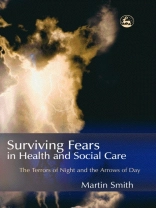Fear can have significant and complex effects on the lives of those working in health and social care, yet it is rarely discussed or investigated. Drawing on powerful first-hand accounts, this book explores the fears experienced when working in child protection, mental health, and with marginalized groups of people, and suggests how these fears can be understood and managed.
The author provides helpful suggestions for good practice and training and describes the vital roles of supervision, management and workplace culture in helping practitioners cope with their distress. He also looks at how family members, colleagues and the police can provide support and discusses the benefits of recognizing and confronting openly the repercussions of fear, as well as celebrating its potentially positive and life-enhancing impact on practice.
Offering innovative new ways of thinking about and coping with fear, this book is essential reading for health and social care professionals, trainers, and managers who need to be aware of issues surrounding fear and anxiety within their organizations.
Tabla de materias
Introduction: The Emerging Importance of Fear in Health and Social Care. 1. Reasons to be Fearful. 2. Child Care and Child Protection Work in Community Settings. 3. Mental Health Work. 4. Working with Dangerous and Vulnerable Adults in Community Settings. 5. Residential and Institutional Settings. 6. Complaints, Bureaucracies and Workplace Bullying. 7. What Helps? I: Colleagues, Supervision, Family. 8. What Helps? II: Management, Workplace Culture, Police Involvement, Reflection, Humour, Research. Afterword: The Gift of Fear. References. Indexes.
Sobre el autor
Martin Smith is practitioner-manager of a Social Services Emergency Duty Team. In this role he works with service users of all ages, particularly in the fields of mental health and child protection. He has researched and published widely on fear and stress in health and social care settings.












